Other factors being equal, 71% of lesbian, gay, bisexual, and transgender (LGBT) adults would prefer a job with an employer based in a state where marriage equality is recognized over an employer based in a state that does not yet recognize marriage equality for same-sex couples, according to the 2009 Out & Equal Workplace Survey, conducted jointly by Harris Interactive, Out & Equal, and Witeck-Combs Communication.
When the same question is asked of lesbian and gay adults only, 79% would prefer working for an employer based in a state allowing same-sex marriage:
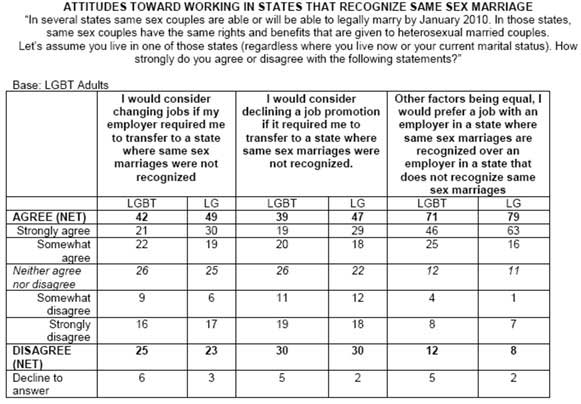
Key findings:
- Respondents were asked to imagine themselves in a hypothetical scenario: They live in a state that recognizes marriage equality, and their employer is requiring that they transfer to a state that does not. Then they were asked how they would respond. More than 4 out of 10 (42%) of LGBT adults say they would consider changing jobs.
- Some 39% of LGBT adults would decline a promotion if it required transferring to a state that did not allow same-sex marriage.
- Among gay and lesbian adults, nearly half (47%) would turn down the promotion.
"As marriage equality reaches more states and touches more lives, more families, and more workplaces, employers based in states that deny this right will begin to face increasing challenges in trying to recruit and retain top LGBT talent," said Out & Equal Founding Executive Director Selisse Berry. "Marriage equality is a real business issue for all of America's business leaders as they strive to achieve a diverse, well-qualified, and loyal workforce."
Recession
The survey results highlight how the weak economy is changing attitudes and openness among LGBT workers:
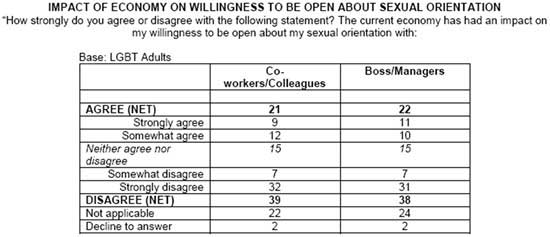
Key findings:
- One in five (21%) LGBT adults report the current economy has had an impact on their willingness to be open about their sexual orientation with coworkers or colleagues.
- Some 22% percent of LGBT adults say that today's economy has had an impact on their willingness to be open about their sexual orientation with their boss or manager.
- 41% of LGBT adults say they are "out" to their coworkers/colleagues, which represents a modest decrease from the 49% of LGBT respondents who said they were out in a September 2008 survey.
Diversity
More than half (55%) of LGBT respondents said that is important that they work for a company known to recruit employees from a variety of diverse backgrounds, compared with 34% of heterosexual respondents:
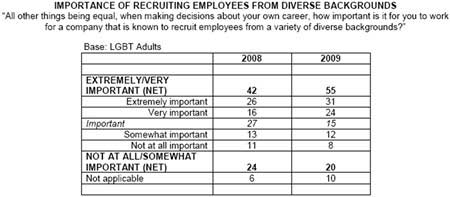
"We don't promote diversity in the workplace just because it's morally right. We promote diversity because it's essential to the success of any organization that aspires to reach a broad cross-section of Americans," said John Berry, director of the US Office of Personnel Management. "Only a workforce that reflects our country's wide variety of backgrounds and perspectives will fully serve the American people."
Comfort Zone
Nearly half (47%) of LGBT adults say they are comfortable introducing their spouse, partner, or significant other to their coworkers in their current or their most recent job, compared with 58% of heterosexual adults. This represents an increase since the same question was asked in June 2008; then, only 37% of LGBT respondents said they were comfortable making such introductions:
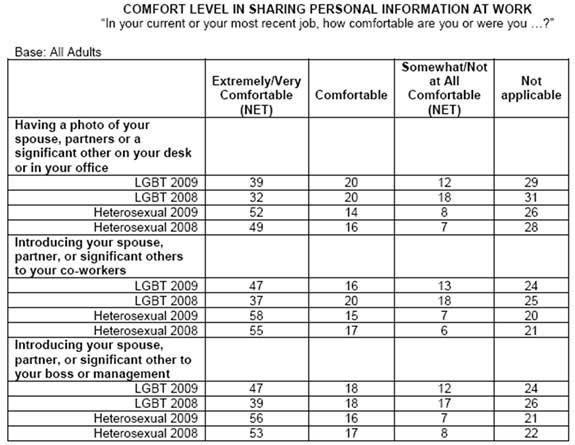 .
.
Key findings:
- Only 3% of LGBT adults say they are not at all comfortable introducing their spouse, partner, or significant other to their coworker, compared with 11% in June 2008.
- Nearly half (47%) of LGBT adults say they were comfortable introducing their spouse, partner, or significant other to their boss or management in their current or most recent job, compared with 56% of heterosexual adults. In answer to a similar survey question in June 2008, only 39% of LGBT respondents said they would b e comfortable in that situation.
- Only 39% of LGBT adults say they are comfortable having a photo of their spouse, partner, or a significant other on their desk or in their office in their current or their most recent job, compared with a 52% of heterosexual adults.
- More than half (56%) of heterosexual adults disagree that they would be uncomfortable if their boss were openly lesbian, gay, bisexual or transgender, compared to 48 percent in June 2008, and nine of ten (93 %) heterosexual adults say they would have a positive or neutral reaction if someone with whom they had been working with told them that he or she is gay or lesbian.
Discrimination
Fears of discrimination continue to explain why some employees are not comfortable being open at work. The new survey shows that 44% of LGBT adults have faced some form of discrimination on the job because of their sexual orientation, a decrease measured since this question was asked in June 2008, when 56% of LGBT of adults reported they had faced some form of discrimination:
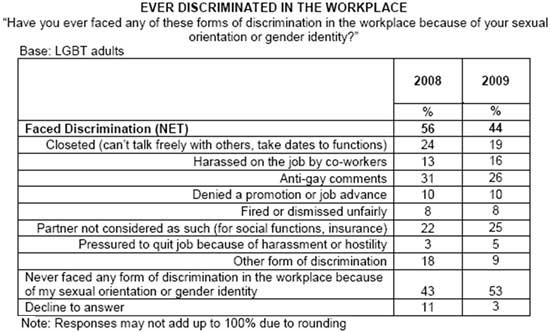
Key findings:
- In the last 24 months, 18% of all LGBT adults surveyed said they faced antigay comments in the workplace because of their sexual orientation or gender identity.
- Some 86% of all heterosexual adults agree that how an employee performs at his or her job should be the standard for judging that employee, not their sexual orientation, up from 79% in a similar survey conducted in June 2008.
- In comparison, 52% of heterosexual adults and 57% of LGBT adults agree lesbian, gay, bisexual and transgender people are treated fairly and equally in their workplace, which represents a modest increase from last June's survey, when 42% of heterosexual adults and 48% of LGBT adults agreed they were treated fairly.
- Nearly half (45%) of LGBT adults and 61% of heterosexual adults said they did not know that under federal law it is legal for an employer to fire someone because he or she is lesbian, gay, or transgender. This is an increase from June 2008 when, in a similar survey, 37% of LGBT adults answered the same.
- Some 77% of heterosexual adults agree that how an employee performs at their job should be the standard for judging an employee, not whether or not they are transgender, an increase from the 67% of heterosexuals who answered the same on an August 2007 survey.
- More than half (57%) of heterosexual adults agree that a transgendered person is entitled to equal benefits on the job, such as health insurance for their partner or spouse, up from the 50% who gave the same answer to a survey conducted in August 2007.
- More than half (55%) of heterosexual adults agree if a person is transgender, and has made the physical transition from a man to a woman, this person should be able to use the women's restroom, compared with 48% who answered the same in an August 2007 survey.
- 58% of heterosexual adults agree if a person was born female, but now identifies as male, this person should be allowed to wear appropriate clothing for men to work, provided it conforms with dress code policies for men's apparel, compared with 47% of respondents asked this question in August 2007.
About the data: Harris Interactive conducted the 2009 Out & Equal Workplace Survey online within the United States between August 10 and 18, 2009, among 2,709 adults (ages 18 and over), of whom 2,274 indicated they are heterosexual and 378 self-identified as gay, lesbian, bisexual, or transgender (including an oversample of lesbian and gay adults). Figures for age, sex, race, education, region, and income were weighted where necessary to bring them into line with their actual proportions in the population. Propensity score weighting also was used to adjust for respondents' propensity to be online.



